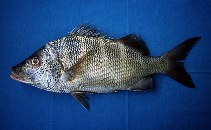| Family: |
Haemulidae (Grunts), subfamily: Haemulinae |
| Max. size: |
71 cm TL (male/unsexed); max.weight: 2,260.0 g |
| Environment: |
reef-associated; marine; depth range 3 - 30 m |
| Distribution: |
Eastern Central Pacific: Gulf of California to Panama. |
| Diagnosis: |
Body oblong, compressed and not very deep (depth contained 2.9 to 3.3 times in standard length ); mouth large and terminal, its posterior end located under the anterior rim of the eye; first gill arch with 18 to 22 gill rakers; dorsal fin notched, with 11 to 12 spines and 16 to 18 soft rays (XI-XII, 16-18); second anal spine slightly longer and stronger than third; scale series above lateral line oblique; juveniles with 3 vertical bars and a caudal spot that disappears with age; adults with 6 or 7 dark gray vertical bars on a yellowish body; head with a dark spot behind the eye (Ref. 55763). |
| Biology: |
Forms schools in coastal reefs during the day but disperses at night in search for food. Often feed by digging in sand (Ref. 5227). |
| IUCN Red List Status: |
Least Concern (LC); Date assessed: 25 May 2007 Ref. (130435)
|
| Threat to humans: |
harmless |
Source and more info: www.fishbase.org. For personal, classroom, and other internal use only. Not for publication.
